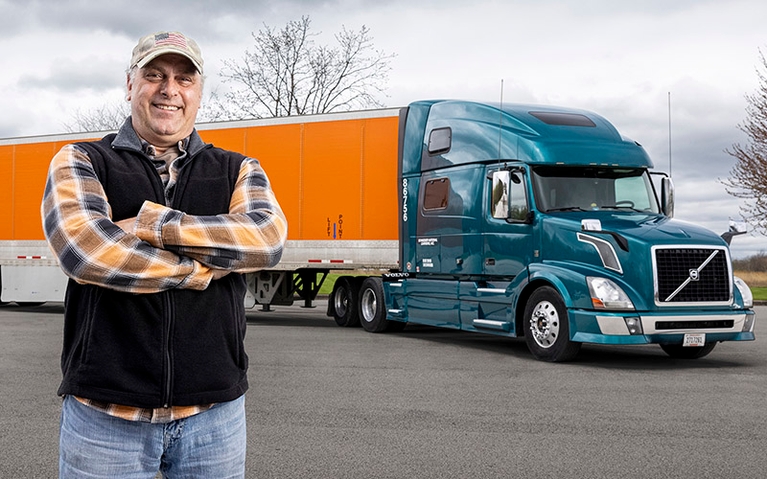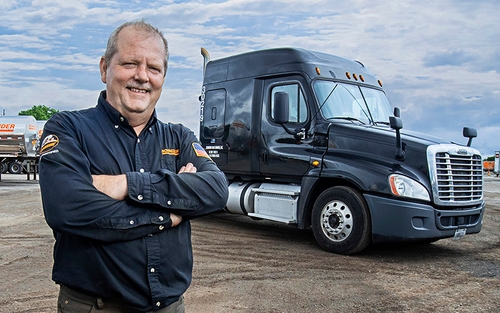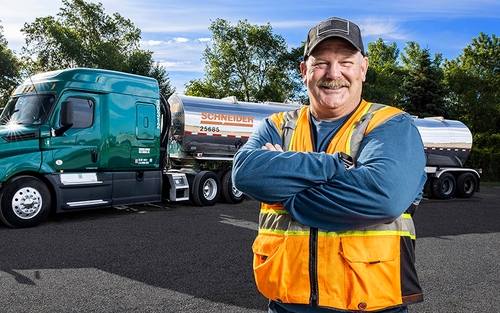What is an owner-operator? Everything you need to know
December 18, 2025

Estimated reading time: 3 minutes
If you're a company truck driver, you've likely heard the term "owner-operator" before. But have you ever wondered what it really means? For those who are new to the transportation industry, learning what a truck owner-operator is can open the door to exciting opportunities and greater independence down the road.
So, what is an owner-operator? We’ll break down what they do, how they differ from company truck drivers and how they generate revenue to help you decide if this path could be your next career move.
Owner-operator meaning
An owner-operator truck driver is someone who owns their own trucking business. As the sole decision maker of their independent business, owner-operators have the freedom to choose:
- What loads they want to haul.
- When and where they operate their business.
- How often they get home.
- Whether they lease or buy a truck.
- Whether they do business with a carrier or operate under their own authority.
Company driver vs. owner-operator
A company truck driver is employed by a company, while an owner-operator is self-employed and runs their own business. Let’s look at how the two compare:
Company driver vs. owner-operator: Responsibilities
Company driver
Handles many responsibilities, such as:
- Hauling freight.
- Delivering loads that are assigned to them.
- Loading and unloading freight (if required).
- Communicating with their leader.
- Adhering to company policies and procedures.
Owner-operator
Manages many of the same things as a company truck driver, plus everything that goes into owning and operating a business, including:
- Finding loads to haul.
- Managing business expenses.
- Making employment decisions.
- Doing the books.
- Maintaining truck(s) and trailer(s).
- Making revenue and earnings decisions.
Company driver vs. owner-operator: Equipment
Company driver
Drives a semi-truck and pulls trailer(s) provided by the company they are employed by.
Owner-Operator
Operates one or more semi-trucks that they either:
- Bought used from a place like Schneider.
- Bought new from a dealership.
- Lease new or used from a company like SFI.
Hauls one or more trailers that they either:
- Purchased used from a place like Schneider.
- Purchased new from a dealership.
- Use from the carrier they do business with, for either a fee or at no charge.
Owner-operators who contract on with Schneider, for example, can haul Schneider trailers at no cost to them.
Company driver vs. owner-operator: Freight
Company driver
Hauls loads assigned to them by dispatch.
Owner-operator
If they do business with a carrier
Selects the freight they want to haul from the carrier’s private load board (typically).
Owner-operators who contract on with Schneider, for example, can use Schneider FreightPower to get access to both spot and contract freight.
If they operate under their own authority
Finds their own loads to haul, either by:
- Hunting for freight on the spot market.
- Working with a freight broker.
- Paying a dispatching service.
- Cold-calling shippers and asking to haul their freight.
Company driver vs. owner-operator: Expenses
Company driver
Avoids paying for fuel, truck maintenance, truck insurance or documentation.
Owner-operator
Pays for all expenses related to owning a truck and a business, including:
- Fuel.
- Truck maintenance.
- Insurance.
- Truck payments.
- Documentation.
- Taxes.
How owner-operators generate revenue
The way owner-operators generate revenue is often different from how company truck drivers are paid. There are essentially three models for how owner-operators generate revenue:
- Flat rate.
- Percentage of revenue.
- Mileage.
Which one an owner-operator chooses – either through a flat rate, percentage of revenue or by the mile – really boils down to how they get their loads and if they operate under their own authority or contract their equipment to a carrier.
Flat rate model
When owner-operators do business with a carrier that has its own load board, one option to earn revenue may be through a flat rate for each load they haul. This method is similar for owner-operators who utilize brokers for their loads.
At Schneider, for example, some owner-operators choose to follow this model and receive a flat rate, which is a combination of revenue and fuel surcharge.
Percentage of revenue model
Earning a percentage of revenue of each load that is hauled is another way owner-operators who do business with a carrier may receive earnings.
At Schneider, for example, some owner-operators choose to follow this model and receive 65% of line haul revenue and 100% of fuel surcharge and accessorials on the loads they haul.
Mileage model
When owner-operators pick freight from a load board, those loads usually show a rate per mile. The rate per mile varies greatly by load.



